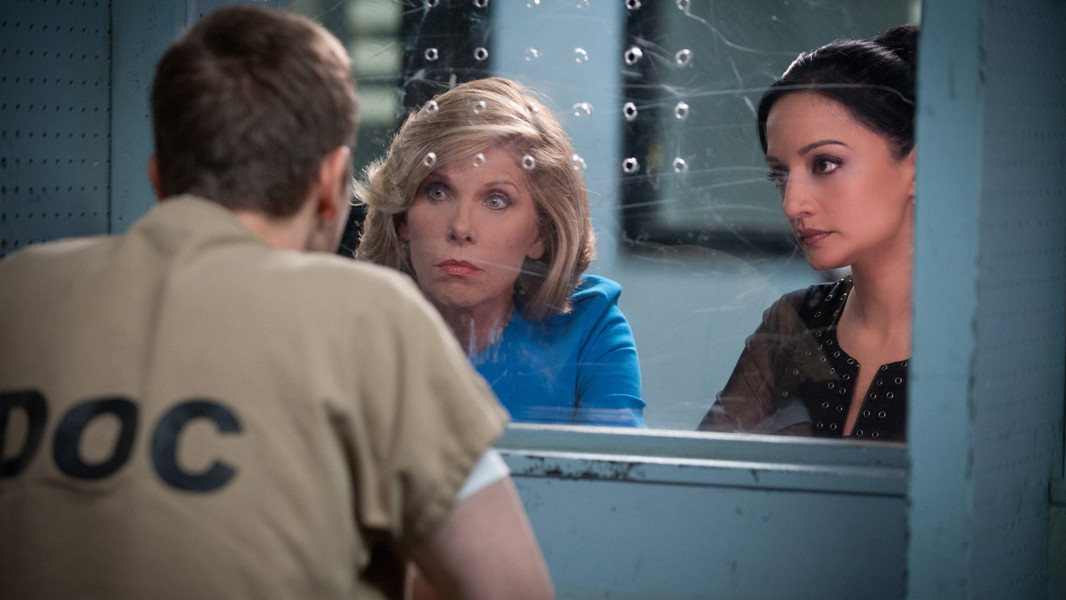 “The future is weird.”
“The future is weird.”
That quote has defined The Good Wife since its creative resurgence last year. There was a period of time during 3rd and 4th seasons that the show fell into a pattern of stagnant stories and the case of the week format. While that worked for the series for a while, it became clear that some forward momentum had to be thrown into the mix, thus the civil war of Lockhart/Gardner was born. The reason I mention this now is because this episode so subtly moved the story of Alicia Florrick and the world surrounding The Good Wife forward.
“Trust Issues” was nowhere near a perfect episode. It was reminiscent of those season 3 episodes where they would pack 2 or 3 continuing storylines, with 2 cases of the week and just have a mess of a story. However, a lot of the good out weighed the bad. Cary continued to sit in jail as Finn continued his crusade against Lemond Bishop. However, unlike last week's premiere Cary was not the emotional center of the episode. Much of that lifting was given to Alicia and Diane, but more on that later. The case became more interesting with the introduction of a rat among Bishop's associates and with his various attempts to pay Cary's bail, however like almost every storyline in the episode, it felt half-assed. As much as some people despise the A, B, C storyline structure, it usually allows for there to be some focus in the episode.
Another facet to the story came from Eli's persistent attempts to get Alicia to run, going as far as to commandeer a White House insider to coax Alicia. The best part about this storyline is that it became intertwined
This episode also saw the return of Lemond Bishop, whose illegitimate businesses landed Cary in jail in the first place. While the character is always entertaining because of the thin line between his legal and illegal dealings, what he brings out in the other characters is one of his more interesting qualities. The majority of the characters on The Good Wife are fueled by a few things: money, power, success. However, their own morals are so rarely tested. That's where the character of Lemond Bishop comes in. Even we as an audience are tested whenever the character is on screen. In this episode in particular, Kalinda is forced to make the decision of whether or not to give a man's name up and most likely have him murdered. It's this type of character dilemma that we don't see often enough in the show that were a welcome addition.
Alicia was given back some of the emotional heavy lifting as she continued to defend her stance against running for State's Attorney. With Eli, Castro, and even some random benefactors wanting to back her, it seemed as if she had to cave eventually. However, in the end, it was anger that took over. It was a fire that we wouldn't have seen in the first season. As it is often said, this series will always be an education of Alicia Florrick and this episode was no exception.
It was a disappointment to see that the original emotional center in Cary was short-lived, but whatever reprehension I had quickly faded away when the focus switched to Diane's departure from Lockhart/Gardner/Canning. The majority of her storyline was spent trying to rope her protege Dean Levine-Wilkins into her move. Despite setbacks involving construction, an awkward Robin (“we're like a coffee shop”), and a shirtless man named Gunter, he ultimately decides to leave LGC and move over to Florrick/Agos along with several other department heads. As Diane stood in her office, it felt like an even bigger emotional jolt than in “Hitting the Fan” when Alicia left. We learned throughout the series that that firm was Diane's child. The one that she never had. To watch her leave it was an emotional tug. As the seconds counted down, she simply picked up her bag, the picture of her and Hilary Clinton (a wonderful callback to the Pilot), and left the firm with a posse in tow. An elevator door close later and it was the end of an era and episode, right?
Nope. We of course had to save Cary. The convenience of the ChumHum storyline was a bit bothersome here, but because of the show's strong track record with realism, I'm going to let it slide. The money from the settlement was used to pay Cary's bail, just as the partners voted to become Florrick/Agos/Lockhart & Associates. After his release Cary and Alicia hug, apparently for the first time.
Something felt off about this episode. It was great in some parts and weaker in others. However, its greatest downfall was the neat little bow that tied all the storylines together and bringing us to a cute, but convenient ending. That feels like the word of the day: convenient. However, the best parts of The Good Wife continue to be those small nuanced directorial decisions that give the show its trademarked realism. The strong point of the episode was the directing, which made the constant juggling of storylines and ideas bearable. Although the episode tied up some of these storylines a bit to early for my taste, it excites me to see where they take this set up.
Hey, I'm Karl, founder and film critic at Smash Cut. I started Smash Cut in 2014 to share my love of movies and give a perspective I haven't yet seen represented. I'm also an editor at The New York Times, a Rotten Tomatoes-approved critic, and a member of the Online Film Critics Society.